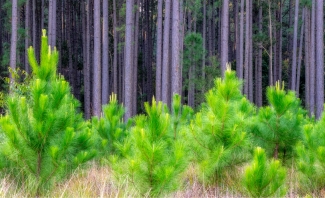A new equilibrium for plantation forests

European forests are facing new demands including helping to mitigate climate change, providing goods and services, generating jobs and acting as a source of fuel and materials. Forestry is also expected to play a major part in supplying the feedstock and services required to develop an innovative, sustainable bioeconomy.
Plantation forests can play a key role in meeting these objectives. In Europe, the area of plantation forestry is increasing, together with the proportion of roundwood and other services provided. There is new evidence that the sustainable management of plantations, particularly as part of a landscape-scale mosaic, has strong potential to deliver against Europe’s emerging policy priorities.
This study draws on recently published scientific research and four case studies (Ireland, Sweden, Italy and Georgia), to ask if plantation forestry is currently meeting its full potential to deliver European environmental and socio-economic policies. It identifies what science can tell us about designing and managing forest plantations, and their use to meet society’s future needs, and sets out the major policy implications.
The study’s main outcomes will be discussed at the ThinkForest event, The future of plantation forests in Europe, on 17 December in Brussels, Belgium.
More information
Plantation forests in Europe: challenges and opportunities. From Science to Policy 9. European Forest Institute.
Authors: Peter Freer-Smith, Bart Muys, Michele Bozzano, Lars Drössler, Niall Farrelly, Hervé Jactel, Jaana Korhonen, Gianfranco Minotta, Maria Nijnik, Christophe Orazio.
The study is published on 10.12.2019 and is freely downloadable here
Photo by @Stephen, Adobestock.com


